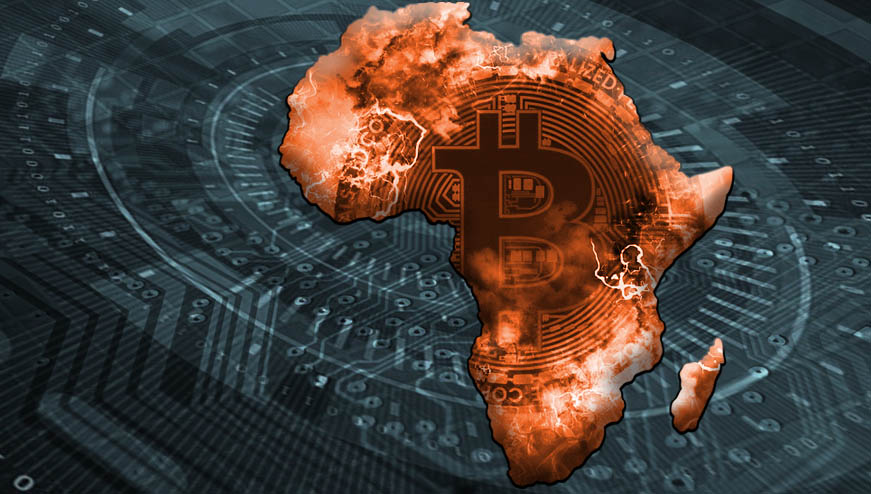Cryptocurrencies and the underlying blockchain technology bear enormous potential to revolutionize the financial industry world wide. Especially in developing countries like in Africa, the need for such a revolution is obvious. But what exactly is the problem cryptocurrencies can solve and how will they achieve that? Find out below!

The Problem:
1.7 Billion people globally are today considered as unbanked. 350 Million of which (17% of global total) live in sub-Saharan Africa. Unbanked means, that these people have no access to basic financial services. But even the among the banked population in Africa, the financial infrastructure often not sufficient to provide adequate services or the financial institutions have lost the public trust through greed and corruption in the past decades. Today, central banks often influenced by government politics are in control of the monetary system. What happens when governments misuse the “money printing machine” in time of economic crisis can be seen in Zimbabwe or Venezuela, where hyperinflation has led to the national currencies being worthless, which renders the currencies useless as a medium of exchange, resulting in a collapse of the countries’ economic systems.
The Solution, a.k.a. Cryptocurrencies:
Boldly speaking, cryptocurrencies are a digital alternative to traditional money in the form of bank notes and coins as you know it. But in contrast to traditional currencies, cryptocurrencies are decentralized. Decentralized currency or peer-to-peer money is a bank-free method used to transfer wealth or ownership of any other commodity without the need of a third party. As this is a characteristic of the underlying blockchain technology, pretty much any services that run on a blockchain can be decentralized. This includes currencies, data storage, hosting and more. Since the activities surrounding these processes are distributed, it makes it nearly impossible for them to be shut down or controlled by an outside authority. This will only become more and more important as time goes on.
A decentralized cryptocurrency follows the same rules that we’ve talked about already. It resists the control of central authority. That means that if you’re holding a currency like Bitcoin or Monero in a private wallet it can’t be taken or seized by an outside authority, or even the developers of those currencies themselves. You can store your funds knowing that they are safe as long as you protect your private keys. In many cases, for example in Bitcoin, new currency (new Bitcoin) is only generated as reward in a process called mining and the total amount of bitcoins to ever be in circulation is capped by an algorithm. In this regard, Bitcoin is more similar to gold than to traditional currencies, which can be printed infinitely by the central banks. Bitcoin, similar to gold, is therefore regarded as a superior store of value by many experts.
Transactions in a decentralized currency system are verified by network nodes through cryptography and recorded in a public distributed ledger called a blockchain. These transactions in most cases only cost a few cents and are validated within seconds or minutes. As blockchain technology doesn’t care about borders, money can also be transferred internationally instantly, almost free of charge!
As the only thing needed to participate in the crypto world is an internet connection, cryptocurrencies can also efficiently and cheaply provide the unbanked population access to a blockchain-based financial system, especially as adoption of the technology increases. This is a very promising outlook for multiple reasons. For one, Bitcoin can protect people against inflationary tendencies of their local currencies and hence help preserve their wealth. Moreover, cryptocurrency and blockchain technology offer people without access to financial institutions who safeguard their assets (e.g. on a bank account) a possibility to store wealth digitally and in a cryptographically secured way. The almost free of charge transactions and the fact that blockchain networks don’t care about borders also bear the potential to revolutionize the worldwide remittances industry, as the high fees charged by payment providers like Western Union can be circumvented using cryptocurrencies and the processing time cut from multiple days to a few seconds. In African countries where many families rely on remittances of family members working abroad, this can be an important step towards financial freedom for the unbanked.
Ultimately, the rise of decentralized finance application promises to bear the potential for a proper financial revolution. Depending on the legal framework of an economy and the strictness with which it is enforced, it can be very hard for people living in developing countries to get access to capital (e.g. in the form of a loan). This can for example be because ownership rights are not recorded/enforced well enough, which in turn prevents people from using a house or a car as collateral for a loan. Decentralized finance applications offering stablecoin loans against cryptocurrency collateral could therefore give a large part of the world’s population access to capital to finance education, housing or businesses, while also offering saving/earning opportunities through liquidity & staking pools.
We've been discussing Brave Browser: https://brave.com/download/ and the potential it can bring with regards to financially underserved countries. By using Brave and the internet to educate yourself you can receive a substantial financial reward in the form of BAT. If compounded over the years and reinvested in the right cryptocurrencies someone could effectively change their lives and financial situation.